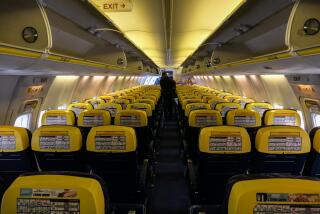Airlines Being Pressured Into Voluntary Reforms
- Share via
It was a high tide of travel consumerism that washed over Washington this spring. Amid proliferating complaints of unexplained delays, baggage hassles and crowded cabins, the phrase “passenger rights” suddenly seemed to be everywhere. And now, if the recent vows of airline executives hold up, that consumer tide may be about to lift us lowly airline passengers a bit.
This month airline executives and members of Congress have met to dicker over a proposed industry campaign to improve service and expand passenger rights. By volunteering this effort, the airlines are likely to avoid legislation.
On Thursday, the Air Transport Assn., the main lobbying group in Washington for the major airlines, gathered half a dozen members of Congress and announced a new “customer service” initiative. Among the highlights: pledges of better information for travelers on air fares and flight delays; a policy of answering all written complaints within 60 days; possible increased compensation for lost bags; and more attention to passengers during delays on the runway. Implementation plans are to be completed within six months.
The pledges fall short of what many elected officials were asking for, and it’s easy for a consumer to be cynical about voluntary reforms. But some improvement in airline service is better than none, and next to none is what coach-class travelers have had in recent years.
Carriers have concentrated on keeping leisure fares relatively low and filling seats. The result, along with a rise in delayed, crowded and neglected passengers, has been record profits. Now, with profit growth beginning to level off, airline executives seem to be paying more attention to the customer’s perspective.
“Clearly there has been an outcry over this issue,” acknowledged Air Transport Assn. spokesman David Fuscus, speaking to the AP last week. “Certainly Congress has been at the forefront of it.
The background to the airlines’ move is vast and tangled--and instructive for anyone who spends money on air travel.
The plight of passengers began getting increased attention early this year when complaint figures jumped and travel agents, weary of handling unhappy customers, began gaining ground in their campaign for a passenger “bill of rights,” which began in 1998.
The most widely decried case was probably over the New Year’s holiday, when hundreds of passengers were stuck on snowbound planes in the Midwest. Travelers in one plane at the Detroit airport were isolated for hours just outside the terminal without food, water or a functioning toilet. (Northwest Airlines has been criticized by the U.S. Transportation Department for its handling of that situation.)
In April, air-traffic delays on domestic flights were up 51% over the previous April. Consumer airline complaints to federal officials were nearly double those in the same month in 1998. (Northwest had the highest rate of complaints, followed by US Airways, then American, then United.)
By the time April was over, senators and representatives had stepped up with six bills aimed at protecting the rights of flying travelers. Most sounded the same notes: Make airlines disclose more information about their sales practices and do more for passengers when things go wrong. One of the most closely watched bills was S. 383, the Airline Passenger Fairness Act, co-sponsored by Sen. John McCain (R-Ariz.), chairman of the Senate Commerce Committee.
But in the weeks after passenger rights emerged as an issue of the moment, legislators and voters witnessed the Columbine High School massacre (prompting debate over gun sales and Hollywood violence) and saw prospects for peace in Kosovo waver (prompting debate over foreign policy). Weighed against matters of life and death, traveler rights may not pack the punch they did two months ago.
And for a while, it seemed the airline industry was counting on the public to forget and move on. In Senate testimony, ATA President Carol Hallett opposed any new regulation and suggested that many reforms proposed in the various passenger rights bills would force increases in air fares. As recently as June 10, a press conference to announce a 12-point voluntary reform campaign was scrubbed at the last minute.
But after that grand embarrassment--the head of United Airlines, Gerald Greenwald, had to face a roomful of reporters and announce that he had nothing to report--airline executives and members of Congress went back to work on a voluntary campaign. Now, veterans of the airline industry and Capitol Hill say, we can expect McCain and the others to put their bills on a back burner.
For airline critics like the anonymous IncogniTraveler columnist for the online magazine Ticked.com, it’s a disappointment that the great reform movement of 1999 may amount to Congress backing off and trusting the airlines to clean their own houses. But if after all this fanfare, the airlines don’t follow through, and if public pressure is great enough, Congress could get annoyed. And federal officials note that legislators do have time to revive one of those six bills before the 106th Congress adjourns in late 2000.
Meanwhile, some entrepreneurs have begun to look upon unhappy travelers as a business opportunity. One recently created Web site, https://www.passengerrights .com, addresses itself specifically to cranky travelers, making it easier for them to lodge complaints with airlines and federal officials. The site is a commercial venture (aimed at winning subscribers to a new $59-a-year newsletter), but its features may help travelers press their causes.
Two more Internet sources for unhappy fliers are the aforementioned Ticked.com, a highly opinionated cyber-magazine for “ticked-off tourists” (https://www.ticked.com), and https://www.airwise.com, a British site rich with information on airlines and airports, along with aconsumer feedback area encouraging travelers to “name and shame” companies that have done them wrong.
Christopher Reynolds welcomes comments and suggestions, but cannot respond individually to letters and calls. Write Travel Insider, Los Angeles Times, Times Mirror Square, Los Angeles 90053, or send e-mail to chris.reynolds@latimes.com.
More to Read
Inside the business of entertainment
The Wide Shot brings you news, analysis and insights on everything from streaming wars to production — and what it all means for the future.
You may occasionally receive promotional content from the Los Angeles Times.











